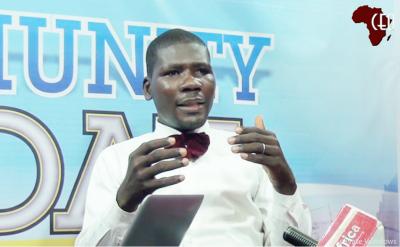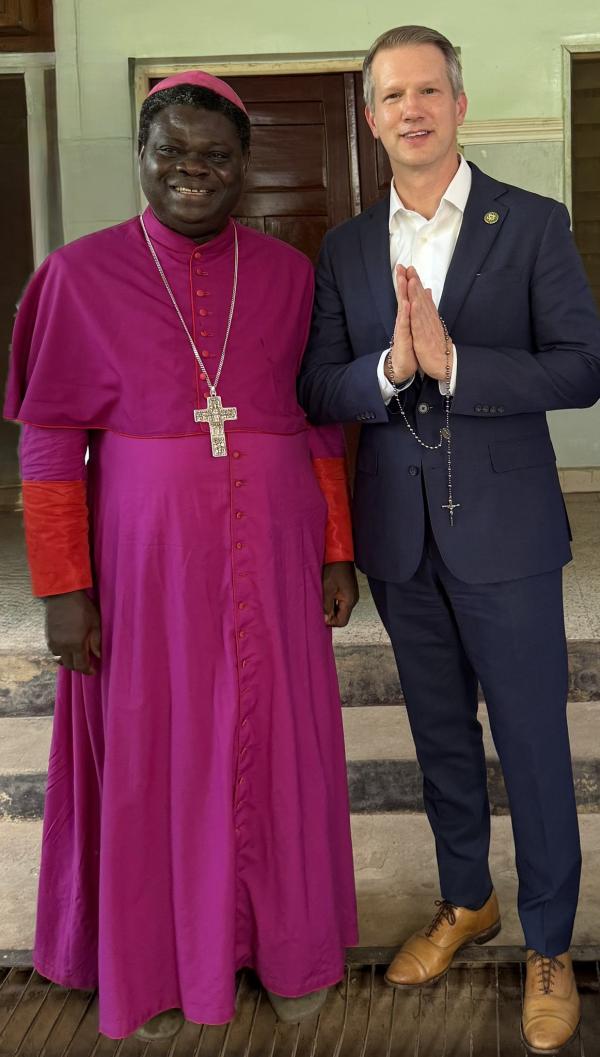
As the United Nations Educational, Scientific and Cultural Organization (UNESCO)';s General Conference set aside the 23rd day of April to mark the World Book and Copyright Day, Niyi Owolabi, Managing Director of Owolan Publishing Company, has charged Nigerians to endeavour to read at least ten minutes per day.
Owolabi gave the charge on Friday during an exclusive interview with CEOAFRICA’s current affairs program, Community Today, on the occasion of the United Nations World Book and Copyright Day.
World Book and Copyright Day, also known as International Day of the Book, is a day to celebrate books as the embodiment of human creativity and the desire to share ideas and knowledge. The day sets in motion a range of events and activities aimed at promoting good reading culture among people.
In his interview, the MD of Owolan Publishing Company disclosed why the World Book and Copyright Day is important; what publishing companies are doing to maintain the position of hardcopy materials amidst the emerging electronic books, and how individual’s reading culture can be improved upon.
In his words, he noted that “In 1995, UNESCO during the general conference declared April 23 as a day to celebrate and promote the reading culture, the publishing community and people who contribute meaningfully, to providing contents. We call them authors. We are to celebrate them and everyone involved in the value chain, and also to raise the awareness, the consciousness of reading, which is a culture to be imbibed.
“Reading is a culture that sustains the world. It helps in gaining other people’s experience. Reading opens you up to the world. The focus is usually on the younger generation, even though it’s not like we’re not talking about the old and adults, but the concentration usually is on the younger generation.
“If you’re able to help a child imbibe a culture, there are chances that the child is going to grow with such. So the publishing community raises awareness into this over and over. Tbilisi, the capital of Georgia has been declared the book capital of the world for 2021, and it’s going to be for a year. Every year, a particular city of the world is declared the book capital.”
Question: There’s this popular saying that when you want to hide something from an average African man, you put it in writing. What do you have to say about that?
Answer: That saying is no longer absolute. What I mean is that it has been challenged over and over again. I’m not saying we’re there yet, but there has been a significant progress in the reading culture over time. However, much still needs to be done. I was invited to speak at a function, and I was telling them that if you see young people who have this reading culture, most especially young professionals who are no longer in school, you know what they read - Motivational Books. But reading is a holistic thing. Just keep gaining insight from many angles. Read wide. What about reading the world map or reading about nature? So I want to challenge Nigerian youths. Yes, we’re moving from what used to be, but we are very far from where we need to be. I want to encourage us, let’s cultivate this habit of reading, let it expose your mind beyond your present environment. For instance, you’ve not been to a particular place, somebody who has been there can document it and make it available for you to read. You don’t have to be there to feel the experience of that particular place. Books happen to be one of the cheapest methods of learning. Experience is said to be the best teacher, and someone rightly said that the experience that will serve as a teacher should be someone else’s experience; it will be cheaper that way. And one of the ways to convey somebody else’s experience is through books. Experience of many years can be put together in a book. Thanks to technology, books are now in various forms, we have it on our devices. So I want to encourage Nigerian youths that the only way to rule this world is through knowledge, and one of the easiest ways to get this knowledge is through books. Just keep adding value to yourself.”
The event also emphasise the reading of books, plays, recitation of poems, publishing and discourse on the laws of copyright and the protection of authors' intellectual property.
Question: There is a popular saying that the reading culture is dwindling by the day. The advent of the internet has even made things worse. How do you think that the government at all levels can promote the reading culture in the younger generation as they catch them young?
Answer: “It’s a project that is beyond what the government alone can do. That’s why publishing stakeholders and everybody in the industry are partnering to raise this awareness; however, government is the largest stakeholder. Growing up there used to be school debates and competitions sponsored by the government at various levels, but these days we don’t have that anymore. So I want to put the challenge to the Nigerian government and other stakeholders at various levels, lets ensure that we bring back this culture. Let’s organize events that will go across the nation and encourage the younger ones to read. UK celebrates their world book day in March. We’re celebrating in Nigeria and some other parts of the world. It is so because they’re trying to avoid any clash between April 23rd and Saint George’s Day and Easter holiday. What they’re currently doing is there is a token given to every child, 1 Pound to buy a book, so they don’t have an excuse. A school owner once contacted me and requested for old books. When I asked what he meant, he said he needed books that are old and no longer in use so that they can buy them at a cheaper price. Nigerian government needs to also look into how they can bring down the cost of the unit of a book. When you look at the cost of bringing in paper to Nigeria - the cost of importation - it’s exorbitant. So I think government needs to do enough to ensure that players in the publishing industry bring down the cost of books. But the truth is, publishers can’t publish at a loss, so whatever the government can do to ensure that the cost of book printing and the entire value chain is significantly reduced then we can make books available at cheaper rates so that more people can access books”.
Question: The younger generation thrives more with audio-visual devises, not books anymore. What is the publishing association doing to curb this trend?
Answer: ‘Books have evolved over time. Books were not in the format we have them centuries back. There were times when books used to be on scrolls. It evolved. An average scroll is about 14 to 52 feet. When you follow the trend, it is believed the hard copy books may not totally go into extinction, but however, the significance may be greatly reduced. Now, I am not speaking for the association. I believe everyone who is serious about the publishing business needs to leverage on technology. Technology has revolutionised the book industry, and publishers are not left out. We are also following the trend. That is why you see many of us now, we have our titles online. What about the security of our content? It is a great concern. You know we have been talking about the piracy rate of the hard book; now it comes to the e-book where people can easily download and share. There are even WhatsApp groups that are created for the purpose of sharing books. Security has been a challenge. However, we are working on it, knowing that there would always be challenges in business. Security or no security, we are going ahead. As long as you want to remain in business, you have to follow the trend.
Question: Do we really have functional Copyright Laws in existence? If we do; what are the challenges and how can these be modified?
Answer: There are copyright laws. There is even a Government agency that is specialized in administering copyright to intellectual property – books, music, graphics or whatever intellectual property that you may have. But the challenge is that even our Laws are obsolete. Some of these Acts were made several years ago. They are not really in tandem with modern day realities. If somebody is arrested or prosecuted for book piracy today the penalty is not as stringent compared to the effect of the offence. So I want to put a challenge to the national assembly, to do something about this. To come up with Laws that are relevant to modern day, not laws that are obsolete. So it is a challenge to the National Assembly.
Last year when most countries experienced periods of unprecedented lockdown, books proved to be very handy in combating isolation, reinforcing ties among people, and fostering creativity.
Question: What would be your advice to the youths towards imbibing the culture of reading?
Answer: I want to throw a challenge. And the challenge is this; everyday, endeavor to read for ten minutes. It is as simple as that.
It is important to note at this juncture that the city of Port Harcourt, Nigeria was announced UNESCO’s World Book Capital back in 2014 beating 10 cities, including Oxford, England to clinch this coveted title.
(Owolan Publishing Company, a publishing outfit which is into the production of affordable learning materials with a concentration on learners from families, low and medium income group.)






















